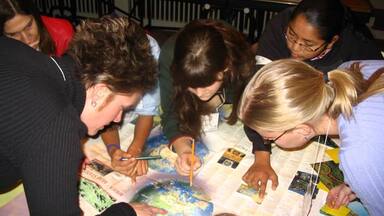Lima, Peru
23 February - 1 March 2001
Objectives
The main objective of the Forum was to find ways to protect the areas that are threatened by tourism.
The global phenomenon of the increase of tourism forces authorities to plan and think of the potential impact that the circulation of voyagers has over a site. For this reason students and teachers of the Youth Forum put emphasis on the need to integrate the World Heritage Education in the school curriculum and recommend that all the countries present in the Forum should ratify the World Heritage Convention.
Other objectives were, to:
- find an innovative method to integrate the World Heritage and its sustainable use in education;
- promote exchange of ideas and knowledge between students and teachers;
- call for bigger interest and understanding in the valorization, protection and preservation of the World's cultural and natural heritage.
The Lima Declaration
Youth Forum on World Heritage in Latin America: Tourism and Sustainable Development
We, the young people and teachers of 18 countries of Latin America and the Caribbean, meeting at the First Youth Forum on World Heritage in Latin America: Tourism and Sustainable Development, from 26 February to 1 March 2001 in Lima, Peru, organized by the Ministry of Education and the National Institute of Culture of the Republic of Peru, with the collaboration of UNESCO, through the Associated Schools Project and the World Heritage Centre, recognize the importance and scope of the themes discussed in the Forum:
That heritage education for young people is one of the bases of sustainable development.
That valuing the past is the pillar on which the future is built.
That strengthening identity through knowledge and the appropriation of our cultural and natural wealth furthers understanding and solidarity between peoples.
That organized tourism encourages the protection of our countries' identities.
That knowledge of World Heritage and of the standard-setting instruments of UNESCO, such as the 1972 Convention on Cultural and Natural Heritage, is fundamental for meeting the challenges of the twenty-first century.
Recommendation
Strengthening educational and cultural policies via an intersectoral approach (Ministries of Education, Culture, Tourism, Environment and others);
Integrating Heritage Education in training and awareness-raising programs for teachers and working at all levels and with all methods of teaching;
Facilitating the development of extra-curricular activities for pupils and teachers (educational excursions, competitions, events, exhibitions, etc.);
Furthering Sustainable Heritage Tourism (eco-tourism and historical tourism) with the participation of the community as the transverse theme of the cultural and economic development of our countries;
Promoting the creation of heritage information networks between young people and teachers of the region;
Organizing campaigns to raise awareness among the population of this issue, involving the mass media;
Encouraging the creation of Spanish-language Internet portals for information on Heritage and Tourism.
At the international level, UNESCO is working on the Heritage in Young Hands project, implemented via the World Heritage Centre and the Associated Schools Project in Member States.
In Latin America and the Caribbean, UNESCO is promoting a regional strategy that proposes the creation of National Technical Committees composed of specialists in cultural and natural heritage, an Associated Schools Coordinator, one member of the National Commission for UNESCO, one pupil, one Associated School supervisor or inspector and one teacher participating in this Forum, with a view to:
Supporting the creation and functioning of the National Technical Committees that will act as counterpart for the effectiveness of the project.
These National Committees would be in charge of:
The exchange of innovative programs and information using new technologies;
Training in organization and content;
Preparation or adaptation of educational materials.
We therefore ask for a commitment from our governments to take the necessary measures for the fulfillment of this Declaration.
We, the young people and teachers present in Lima, declare our determined commitment to active participation, convinced of the urgent need to defend our Latin American and Caribbean identity. We shall disseminate this document as widely as possible through the communication media when we return to our respective countries.
It will depend on you whether our dreams become reality.
The participants.
Outcome
The organization of the Youth Forum in Latin America and Caribbean served as a catalyst and inspired initiatives to establish a co-operation network in order to promote the World Heritage Education.
For the students, the Forum was a possibility to meet up with other young people coming from other countries and to discuss about themes of common interest and to find their own role in the conservation of World Heritage.
For the teachers the Forum was an occasion to discuss about new education perspectives and to develop the World Heritage Education.
The experiences from the Forum were diverse and positive. The cultural exchange served a reciprocal enrichment and made the participants to tie friendships that allowed deepening their knowledge about other cultures. The Forum was a positive frame to obtain the objectives proposed.
Organizers were pleased with the contribution of students and teachers who showed their interest to reinforce their cultural identities, solidarity and universal values, to renew their views and expectations and to educate and progress in a peaceful and friendly world. We believe that the girls and boys participated in the Forum are real "Patrimonitos", guardians and protectors of the World Heritage.
Organizers
UNESCO
INC
Ministerio de Education de Perú
The National Commission of Co-operation of Peru for UNESCO
Participants and observers
94 participants, of which
52 students and 26 teachers from Argentina, Bolivia, Brazil, Colombia, Costa Rica, Cuba, Chile, Ecuador, Guatemala, Honduras, Mexico, Nicaragua, Panama, Paraguay, Peru, Dominican Republic, Uruguay, Venezuela,
and 16 other participants.
Countries represented
Argentina, Bolivia, Brazil, Colombia, Costa Rica, Cuba, Chile, Ecuador, Guatemala, Honduras, Mexico, Nicaragua, Panama, Paraguay, Peru, Dominican Republic, Uruguay, Venezuela
Organizations involved:
UNESCO ASP
UNESCO WHC
NORAD (Norwegian Agency for Development Co-operation)


